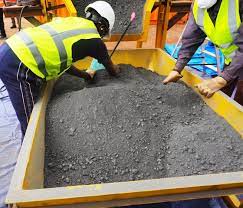The hearing in the fine coal case on Tuesday 28 November 2023 focused on the quantity of fine coal contained in his cargo. Through his questions, the prosecutor attempted to demonstrate that Essakane had made a false declaration.
At the start of the proceedings, the prosecutor pointed out that Essakane had declared 399,069 kg of fine coal, whereas after the seizure it was found to be exporting 629,000 kg of fine coal. “What explains this?” asked the prosecutor.
The Essakane country representative, representing the Managing Director of Essakane, explained that this was an estimated figure. There may be margins of error. In her opinion, the mine estimates the mass, but it may vary after refining.
But for the prosecutor, this margin of error is akin to a margin of fraud.
The president of the court took up the prosecutor’s question in another form, saying: “You declared a value to the authorities and then realised that this value was double what you had declared. Did you go back to the authorities to explain this to them?
“There’s no point in informing the authorities of this surplus, because at the end of the chain, it’s the quantity of gold after refining that the authorities consider”, replies the representative.
The prosecutor called a customs expert to the stand.
He explains that in its export request letter, Essakane asked to export 223,614 kg.
Already in 2015, it exported 399,059 kg and in 2016 281,234 kg. In 2018, 494,635 kg were being exported, making a total of 1,174,928 kg compared with 447,288 kg, giving a surplus of 697,640 kg.
After the customs expert’s explanations, the prosecutor returned to the case: “Can we draw the conclusion that there is fraud from the inconsistencies in the figures provided by Essakane?”. “Yes, there is a false declaration” replied the customs expert.
This is how Essakane’s lawyers got involved in the debates. “Do we agree that Essakane didn’t just get up and leave its cargo with Bolloré? There is an authorisation from the Ministry of Mines, Customs and BUMIGEB”. “Yes!” replied the customs expert.
The defence lawyers also pointed out that, at the time of export, the Ministry had authorised 399,059 kg. “We don’t see the difference between the quantity authorised by the Ministry and what we exported”, they said.
But the customs expert made it clear that the special export authorisation was not issued by the Ministry, but by the one-stop shop («guichet unique de commerce»). The expert also added that Essakane was well aware that Burkina Faso legislation did not permit the export of fine coal. “In the history of mining in Burkina Faso, no mine has ever exported fine coal; they store it on their sites”, he said.
The customs expert also explained that the Directorate General of Customs had no authority to authorise the export of fine coal. He points out that it was officials who gave this authorisation without any legal basis. This is why they are named in the case.
According to Essakane’s lawyers, their client could export fine coal under the Mining Code, which authorises the export of mineral substances derived from mining. It was then that the customs expert made them understand that they were confusing terms. The court’s experts were called in to rule on the matter.
They claim that fine coal is not a mineral substance derived from extraction but a product derived from the process of treating fine coal. The legal experts confirm the view of the customs expert, who concluded that Burkina Faso’s legislation does not permit the export of fine coal.
The hearing was adjourned to resume on Thursday 29 November at 9:00am.
#Mines_Actu_Burkina









